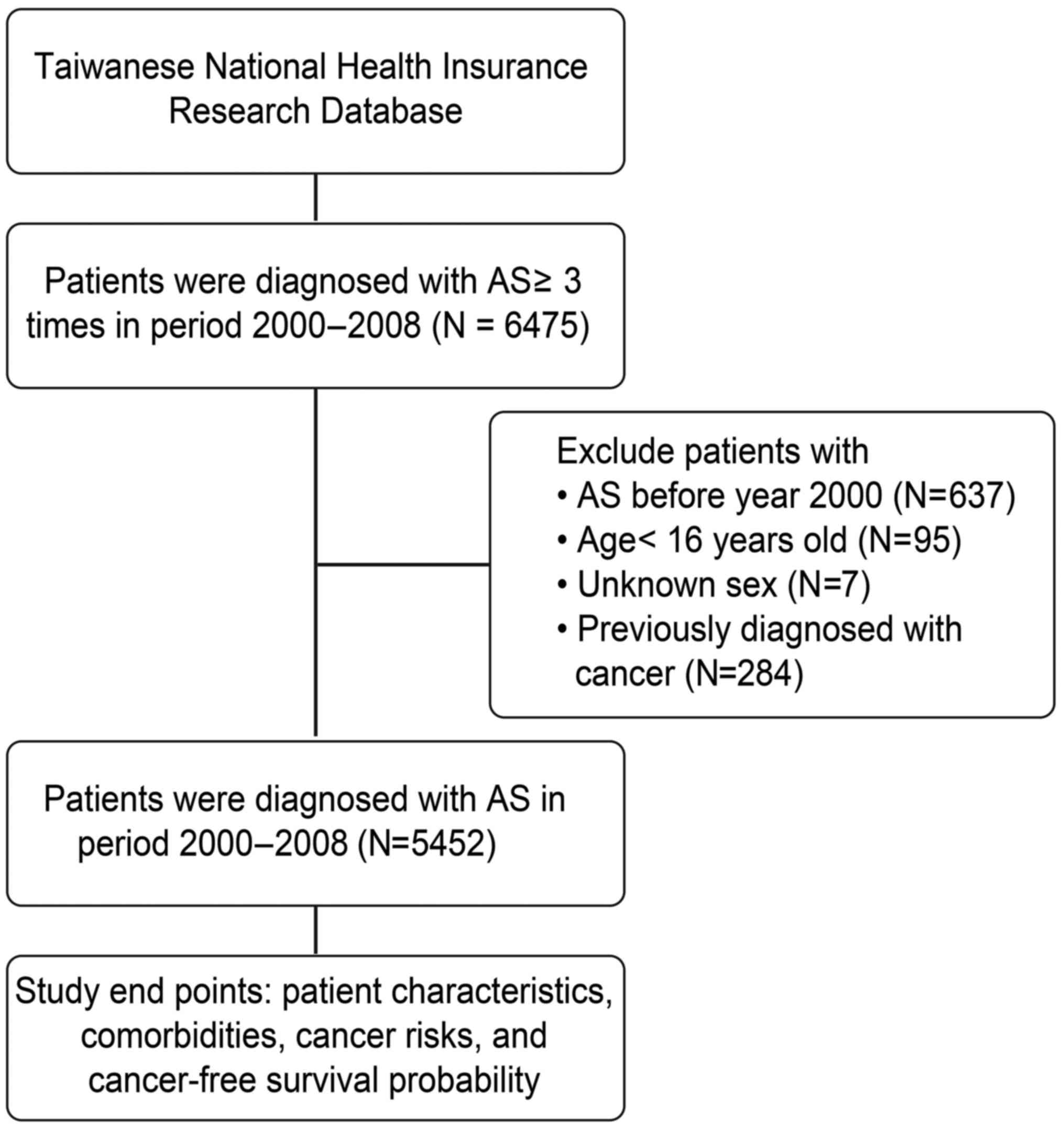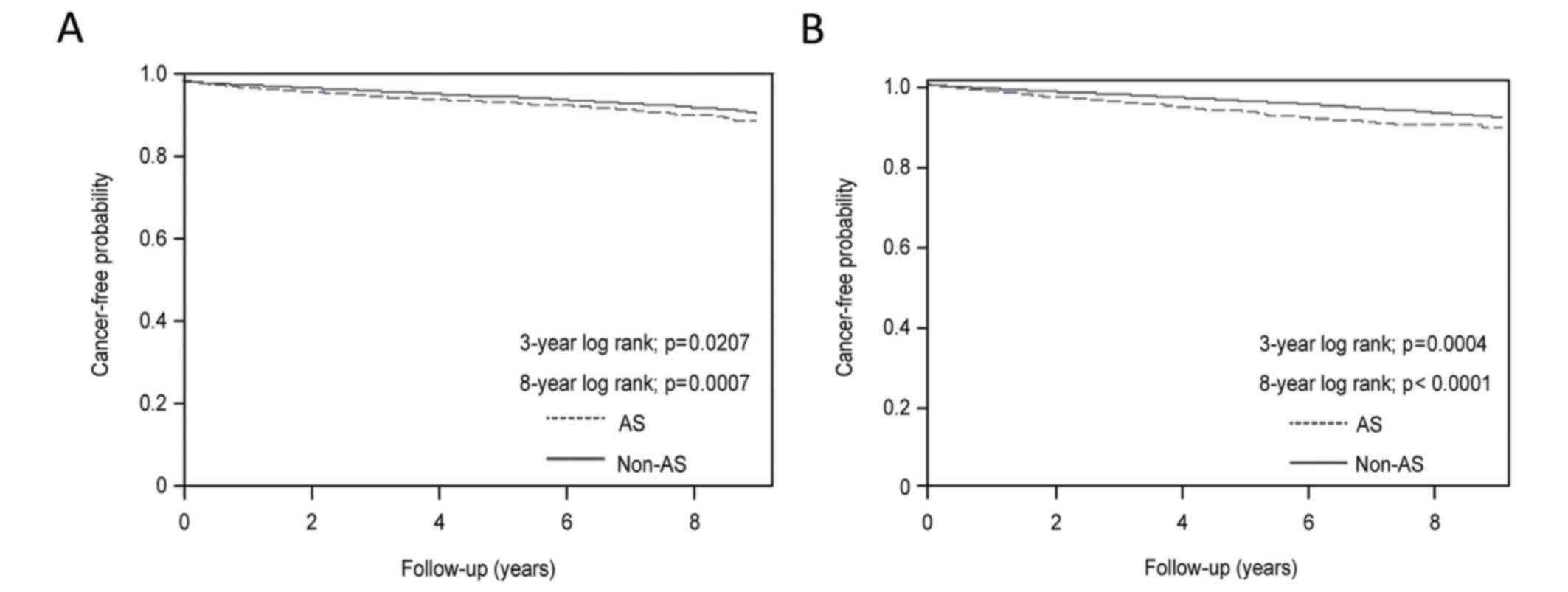|
1
|
Braun J and Sieper J: Ankylosing
spondylitis. Lancet. 369:1379–1390. 2007. View Article : Google Scholar : PubMed/NCBI
|
|
2
|
Chen HH, Chen TJ, Chen YM, Ying-Ming C and
Chen DY: Gender differences in ankylosing spondylitis-associated
cumulative healthcare utilization: A population-based cohort study.
Clinics (Sao Paulo). 66:251–254. 2011. View Article : Google Scholar : PubMed/NCBI
|
|
3
|
Ho HH and Chen JY: Ankylosing spondylitis:
Chinese perspective, clinical phenotypes, and associated
extra-articular systemic features. Curr Rheumatol Rep. 15:3442013.
View Article : Google Scholar : PubMed/NCBI
|
|
4
|
Selmi C: Diagnosis and classification of
autoimmune uveitis. Autoimmun Rev. 13:591–594. 2014. View Article : Google Scholar : PubMed/NCBI
|
|
5
|
Bayen H, Bayen MC, De Curzon HP,
Espinasse-Berrod MA, Manderieux N, Furia M and Campinchi R:
Involvement of the posterior eye segment in HLA B27(+)
iridocyclitis. Incidence. Value of surgical treatment. J Fr
Ophtalmol. 11:561–566. 1988.(In French).
|
|
6
|
Davey-Ranasinghe N and Deodhar A:
Osteoporosis and vertebral fractures in ankylosing spondylitis.
Curr Opin Rheumatol. 25:509–516. 2013. View Article : Google Scholar : PubMed/NCBI
|
|
7
|
Atzeni F, Defendenti C, Ditto MC,
Batticciotto A, Ventura D, Antivalle M, Ardizzone S and
Sarzi-Puttini P: Rheumatic manifestations in inflammatory bowel
disease. Autoimmun Rev. 13:20–23. 2014. View Article : Google Scholar : PubMed/NCBI
|
|
8
|
Siegel R, Naishadham D and Jemal A: Cancer
statistics for Hispanics/Latinos, 2012. CA Cancer J Clin.
62:283–298. 2012. View Article : Google Scholar : PubMed/NCBI
|
|
9
|
Mantovani A, Allavena P, Sica A and
Balkwill F: Cancer-related inflammation. Nature. 454:436–444. 2008.
View Article : Google Scholar : PubMed/NCBI
|
|
10
|
Balkwill F and Mantovani A: Inflammation
and cancer: Back to Virchow? Lancet. 357:539–545. 2001. View Article : Google Scholar : PubMed/NCBI
|
|
11
|
Hreggvidsdottir HS, Noordenbos T and
Baeten DL: Inflammatory pathways in spondyloarthritis. Mol Immunol.
57:28–37. 2014. View Article : Google Scholar : PubMed/NCBI
|
|
12
|
Iqbal U, Nguyen PA, Syed-Abdul S, Yang HC,
Huang CW, Jian WS, Hsu MH, Yen Y and Li YC: Is long-term use of
benzodiazepine a risk for cancer? Medicine. 94:e4832015. View Article : Google Scholar : PubMed/NCBI
|
|
13
|
WHO International Classification of
Disease codes. http://www.who.int/classifications/icd/en/November
17–2016
|
|
14
|
Hwang CY, Chen YJ, Lin MW, Chen TJ, Chu
SY, Chen CC, Lee DD, Chang YT, Wang WJ and Liu HN: Cancer risk in
patients with allergic rhinitis, asthma and atopic dermatitis: A
nationwide cohort study in Taiwan. Int J Cancer. 130:1160–1175.
2012. View Article : Google Scholar : PubMed/NCBI
|
|
15
|
Feltelius N, Ekbom A and Blomqvist P:
Cancer incidence among patients with ankylosing spondylitis in
Sweden 1965–95: A population based cohort study. Ann Rheum Dis.
62:1185–1188. 2003. View Article : Google Scholar : PubMed/NCBI
|
|
16
|
Janssen F and Kunst AE: ICD coding changes
and discontinuities in trends in cause-specific mortality in six
European countries, 1950–99. Bull World Health Organ. 82:904–913.
2004.PubMed/NCBI
|
|
17
|
Baecklund E, Ekbom A, Sparén P, Feltelius
N and Klareskog L: Disease activity and risk of lymphoma in
patients with rheumatoid arthritis: Nested case-control study. BMJ.
317:180–181. 1998. View Article : Google Scholar : PubMed/NCBI
|
|
18
|
Kanai T, Nemoto Y, Tomita T, Totsuka T,
Watanabe M and Hibi T: Persistent retention of colitogenic CD4+
memory T cells causes inflammatory bowel diseases to become
intractable. Inflamm Bowel Dis. 15:926–934. 2009. View Article : Google Scholar : PubMed/NCBI
|
|
19
|
Mariette X, Matucci-Cerinic M, Pavelka K,
Taylor P, van Vollenhoven R, Heatley R, Heatley R, Walsh C, Lawson
R, Reynolds A and Emery P: Malignancies associated with tumour
necrosis factor inhibitors in registries and prospective
observational studies: A systematic review and meta-analysis. Ann
Rheum Dis. 70:1895–1904. 2011. View Article : Google Scholar : PubMed/NCBI
|
|
20
|
Raaschou P, Frisell T and Askling J; ARTIS
Study Group, : TNF inhibitor therapy and risk of breast cancer
recurrence in patients with rheumatoid arthritis: A nationwide
cohort study. Ann Rheum Dis. 74:2137–2143. 2015. View Article : Google Scholar : PubMed/NCBI
|
|
21
|
Au WY, Hawkins BR, Cheng N, Lie AK, Liang
R and Kwong YL: Risk of haematological malignancies in HLA-B27
carriers. Br J Haematol. 115:320–322. 2001. View Article : Google Scholar : PubMed/NCBI
|
|
22
|
Wick RR, Nekolla EA, Gaubitz M and Schulte
TL: Increased risk of myeloid leukaemia in patients with ankylosing
spondylitis following treatment with radium-224. Rheumatology
(Oxford). 47:855–859. 2008. View Article : Google Scholar : PubMed/NCBI
|
|
23
|
Weiss HA, Darby SC, Fearn T and Doll R:
Leukemia mortality after X-ray treatment for ankylosing
spondylitis. Radiat Res. 142:1–11. 1995. View Article : Google Scholar : PubMed/NCBI
|
|
24
|
Raymond AK and Jaffe N: Osteosarcoma
multidisciplinary approach to the management from the pathologist's
perspective. Cancer Treat Res. 152:63–84. 2009. View Article : Google Scholar : PubMed/NCBI
|
|
25
|
Spector TD, Ollier W, Perry LA, Silman AJ,
Thompson PW and Edwards A: Free and serum testosterone levels in
276 males: A comparative study of rheumatoid arthritis, ankylosing
spondylitis and healthy controls. Clin Rheumatol. 8:37–41. 1989.
View Article : Google Scholar : PubMed/NCBI
|
|
26
|
Gordon D, Beastall GH, Thomson JA and
Sturrock RD: Androgenic status and sexual function in males with
rheumatoid arthritis and ankylosing spondylitis. Q J Med.
60:671–679. 1986.PubMed/NCBI
|
|
27
|
Alcalay M, Bontoux D, Maire P, Matuchansky
C, Alcalay D and Tanzer J: HLA-B27 and colorectal cancer. N Engl J
Med. 307:443–444. 1982. View Article : Google Scholar : PubMed/NCBI
|
|
28
|
Singh HJ, Nimarpreet K, Ashima, Das S,
Kumar A and Prakash S: Study of bone mineral density in patients
with ankylosing spondylitis. J Clin Diagn Res. 7:2832–2835.
2013.PubMed/NCBI
|
|
29
|
Feltelius N, Hvatum M, Brandtzaeg P,
Knutson L and Hällgren R: Increased jejunal secretory IgA and IgM
in ankylosing spondylitis: Normalization after treatment with
sulfasalazine. J Rheumatol. 21:2076–2081. 1994.PubMed/NCBI
|
|
30
|
Van Praet L, Jacques P, Van den Bosch F
and Elewaut D: The transition of acute to chronic bowel
inflammation in spondyloarthritis. Nat Rev Rheumatol. 8:288–295.
2012. View Article : Google Scholar : PubMed/NCBI
|
|
31
|
Kanai T, Watanabe M and Hibi T:
Systemically circulating colitogenic memory CD4+T cells may be an
ideal target for the treatment of inflammatory bowel diseases. Keio
J Med. 58:203–209. 2009. View Article : Google Scholar : PubMed/NCBI
|
|
32
|
Hemminki K, Liu X, Försti A, Ji J,
Sundquist J and Sundquist K: Effect of autoimmune diseases on
incidence and survival in subsequent multiple myeloma. J Hematol
Oncol. 5:592012. View Article : Google Scholar : PubMed/NCBI
|
|
33
|
Hemminki K, Liu X, Ji J, Sundquist J and
Sundquist K: Autoimmune disease and subsequent digestive tract
cancer by histology. Ann Oncol. 23:927–933. 2012. View Article : Google Scholar : PubMed/NCBI
|
|
34
|
Fallah M, Liu X, Ji J, Försti A, Sundquist
K and Hemminki K: Autoimmune diseases associated with non-Hodgkin
lymphoma: A nationwide cohort study. Ann Oncol. 25:2025–2030. 2014.
View Article : Google Scholar : PubMed/NCBI
|
|
35
|
Hemminki K, Liu X, Ji J, Försti A,
Sundquist J and Sundquist K: Effect of autoimmune diseases on risk
and survival in female cancers. Gynecol Oncol. 127:180–185. 2012.
View Article : Google Scholar : PubMed/NCBI
|
|
36
|
Sun LM, Muo CH, Liang JA, Chang SN, Sung
FC and Kao CH: Increased risk of cancer for patients with
ankylosing spondylitis: A nationwide population-based retrospective
cohort study. Scand J Rheumatol. 43:301–306. 2014. View Article : Google Scholar : PubMed/NCBI
|
















